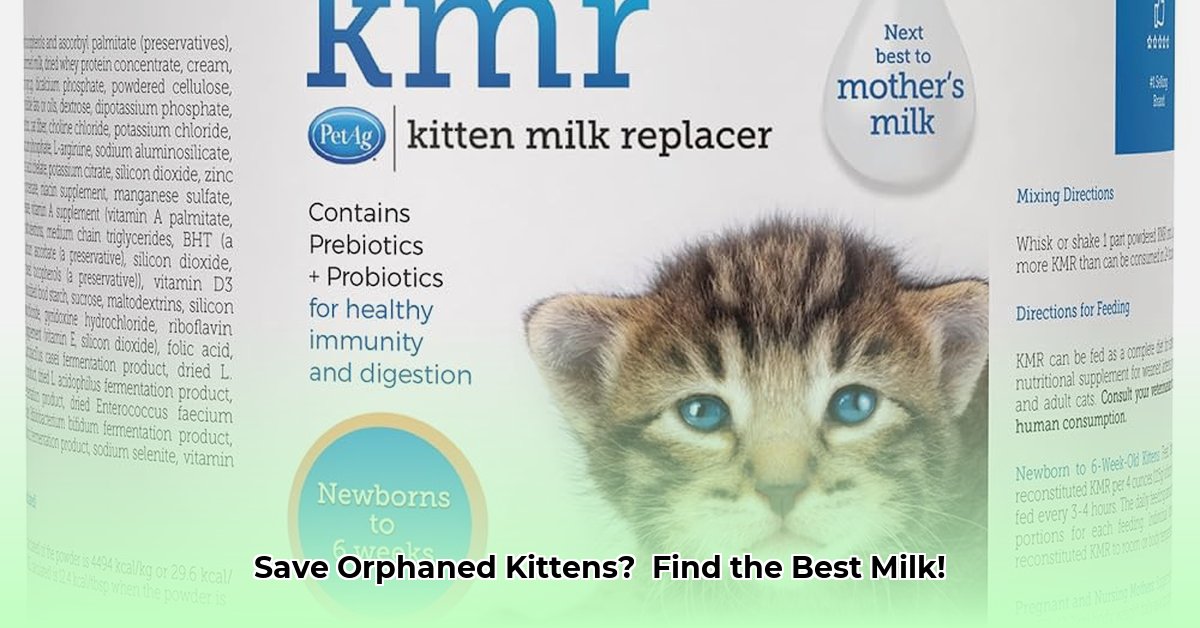
Choosing the Right Kitten Milk Replacer
Finding the perfect kitten milk replacer (KMR) is crucial for a healthy kitten. Tractor Supply Co. offers various options, but selecting the right one requires careful consideration. This guide helps you navigate the choices, focusing on nutritional needs and responsible pet ownership. For more information on KMR options at Tractor Supply, check out this helpful resource.
First, determine your kitten's age. Neonatal kittens (newborn) have unique dietary requirements compared to older kittens. Always check the packaging for the recommended age range. Using an inappropriate formula can lead to digestive upset or nutritional deficiencies. Think of it like choosing clothing sizes—a newborn needs a newborn size; using adult clothing would be impractical and potentially harmful. Secondly, closely examine the ingredients. Look for high-quality protein sources and healthy fats, avoiding fillers that offer minimal nutritional value. A KMR mimicking a mother cat's milk is ideal. Finally, consider ease of preparation. Some formulas mix easier than others, impacting your daily routine. If you have multiple kittens, larger quantities will likely be necessary.
Preparing and Feeding Kitten Milk Replacer
Precisely following the package instructions is essential. Improper mixing can cause nutritional imbalances, harming your kitten's health. Measure carefully and use clean, sterilized bottles and nipples to prevent infections. Leftover formula should be stored correctly, avoiding room-temperature storage for extended periods.
Avoid overfeeding; start with small amounts and gradually increase feedings as your kitten grows. Monitor your kitten for digestive issues like diarrhea or vomiting—these signs require immediate veterinary attention. "Early detection is key to addressing potential problems and ensuring the kitten's well-being," advises Dr. Emily Carter, DVM, from the American Veterinary Medical Association.
Warm the milk to body temperature before feeding; testing a drop on your wrist is a simple method. Never microwave the milk, as this can cause uneven heating and burn your kitten. Use an appropriately sized bottle and nipple to prevent choking or frustration. Burp your kitten during and after feedings to alleviate gas.
Sustainable Pet Ownership: A Broader Perspective
While directly linking kitten milk replacer to large-scale sustainable agriculture is challenging, the choice of KMR aligns with broader sustainable pet ownership practices. Responsible pet ownership minimizes the environmental impact of pet care. “Considering the environmental footprint of pet food production is becoming increasingly vital,” notes Dr. Sarah Miller, PhD, from the Environmental Protection Agency. This includes choosing sustainably sourced products whenever possible. Looking for brands prioritizing environmentally friendly packaging and minimizing waste is a step toward more eco-conscious pet ownership.
Choosing a KMR that uses sustainably sourced ingredients, even in a small way, reflects a commitment to responsible consumption. By selecting products that demonstrate a commitment to sustainability, pet owners can actively support eco-conscious business practices and actively minimize the overall environmental footprint of their pet's care. This approach extends responsible practices beyond just the selection of the KMR, showing awareness of the broader environmental effects of pet ownership.
Key Considerations for Responsible Kitten Care
Providing the best KMR is just one aspect of responsible kitten care. A clean and safe environment, regular veterinary care, and a gradual weaning process are equally vital. Even with ideal nutrition, a supportive environment is key to your kitten's overall well-being.
- Cleanliness: Prevents infections and maintains your kitten's health.
- Veterinary Care: Regular check-ups are essential for early health issue detection.
- Safe Environment: Reduces stress and allows for healthy exploration.
- Gradual Weaning: Avoids digestive upset when introducing solid food.
Remember, your veterinarian is your primary resource for concerns regarding your kitten's health and well-being. Their expert guidance is invaluable in ensuring your kitten thrives.